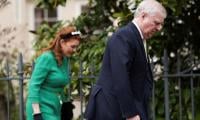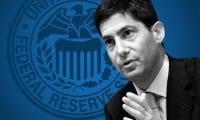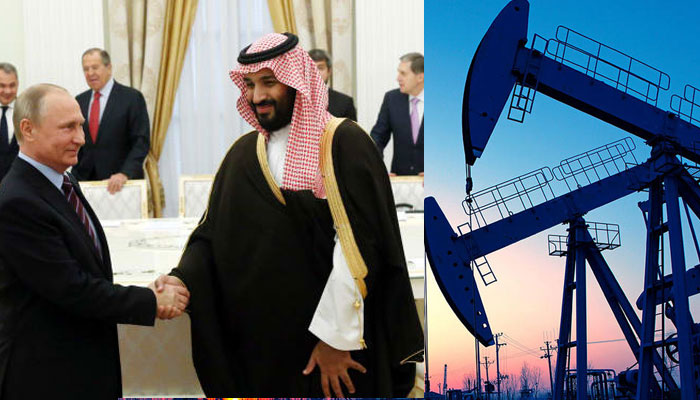KSA, Russia oil price war escalates: Trillions vaporise from world economy
The dramatic drop in oil prices were triggered by a row between Saudi Arabia and Russia over oil output
LONDON: Shares around the world faced their worst day since the financial crisis with the dramatic falls leading to the day being dubbed "Black Monday". While oil prices recorded their biggest one-day crash since the first Gulf War in 1991, tumbling as traders bet that a clash between oil giants Saudi Arabia and Russia could flood a world already hobbled by the coronavirus outbreak with a glut of crude.
The shock to oil also rattled stock markets, which were already in a panic because of the coronavirus outbreak. Markets in Asia, Europe plunged during Monday trading, while US stocks recorded massive declines. Analysts described the market reaction as "utter carnage".
The dramatic drops were triggered by a row between Saudi Arabia and Russia over oil output. Russia refused to go along with OPEC's proposal to rescue the coronavirus-battered oil market by further cutting production at a meeting in Vienna on Friday. The KSA said it would slash prices and pump more oil, sparking fears of a price war. Saudi Arabian state oil giant Aramco’s move over the weekend to cut most of its official selling prices triggered the oil-price crash, with a barrel of Brent crude, the global gauge of prices, closing down 24% at $34.36 (Rs5,343). The standoff left the oil industry shell-shocked and sparked a 10% plunge in oil prices Friday. The move is seen as Saudi Arabia flexing its muscles in the oil market to make Russia fall into line. Russia's refusal to cut production amounted to a slap to US shale oil producers, many of which need higher oil prices to survive. The price of crude oil is about half the level it hit in early January. That in turn undermined stock markets, although it wasn't the only factor. Thelower oil price is a problem for the credit markets.
London's index of top shares ended the day almost 8% lower, with some £125 billion (Rs25,576) wiped off the value of major UK firms. In the US, the major stock indexes fell so sharply at the start of trading, that the buying and selling of shares was halted for 15 minutes, as a so called "circuit breaker" aimed at curbing panicky selling came into effect. The Dow Jones industrial average fell more than 2,000 points, the biggest ever fall in intraday trading. The price of international oil benchmark Brent fell almost a third in its biggest drop since the Gulf War in 1991 before recovering slightly to trade 20% lower. "There is panic setting in the market right now," said Andrew Lo, professor of finance at MIT's Sloan School of Management. "Things are going to get worse before they get better." "It's going to be a very difficult set of market conditions for people to navigate through over the next few months. One has to have a strong stomach," he added.
Falls on the Dow Jones index of major companies were led by oil firms Chevron and Exxon Mobil, which fell more than 7%. On the Nasdaq Composite, hard drive maker Western Digital fell 11% and Tesla 10%. Oil firms Apache and Marathon oil led the S&P 500 index down, dropping 40% apiece. The UK and US falls, were mirrored by similar falls in Europe, with the main stock market indexes in France, Germany and Spain all closing over 7% lower. "It shows a level of nervousness in the market which I haven't seen in a long time," said Justin Urquhart-Stewart, co-founder of Seven Investment Management. Investors are selling stocks at such a rate because they cannot quantify what Saudi Arabia and Russia might do, he said. In Frankfurt, Deutsche Bank led the declines, falling 12%, followed by Mercedes-Benz maker Daimler, down 10%. Similarly in Paris, banks such as Crédit Agricole and Société Générale fell 10%. The Russian rouble fell over 8%, on track for its worst one-day drop since December 2014.
Earlier on Monday, Asian stock markets had also fallen sharply, with Japan's Nikkei 225 index down 5% while Australia's ASX 200 slumped 7.3% - its biggest daily drop since 2008. In China, the benchmark Shanghai Composite fell 3%, while in Hong Kong, the Hang Seng index sank 4.2%. In the UK, oil firms saw the biggest drops, with shares in Shell and BP down by about 15%, while Premier Oil saw its shares more than halve in value. Elsewhere on the markets, the price of gold hit a seven-year high, trading at $1,700 per ounce. Gold is often seen as a desirable asset to hold in times of uncertainty. And in a historic moment, the price on benchmark UK government bonds for two-, three-, four-, six- and seven-year maturities rose so high that yields - or the rate of return on the bond - briefly turned negative for the first time. A negative yield means investors will lose money from holding the bond.
Many American shale producers are likely to be unviable and they have borrowed in the high risk debt market, issuing what are called junk bonds. So there is the potential for losses for investors who hold those bonds. Cheaper oil is obviously a benefit for users. Airlines have been hit by a decline in bookings, but cheaper fuel will offset that a little. And in time, there will be an impact on the price that motorists pay, although in many countries, including Britain, tax accounts for most of what they pay.
-
 US Opens Civil Rights Probe Into Alex Pretti Shooting: Report
US Opens Civil Rights Probe Into Alex Pretti Shooting: Report -
 Prince William, Kate Middleton Decide Next Step For Prince George
Prince William, Kate Middleton Decide Next Step For Prince George -
 Catherine O’Hara: Home Alone Actress Dies After 'brief Illness'
Catherine O’Hara: Home Alone Actress Dies After 'brief Illness' -
 Princess Anne Refuses An Offer Made At Palace
Princess Anne Refuses An Offer Made At Palace -
 'The Rookie's' Mekia Cox Reveals Her Daughter's Debut In Season 8
'The Rookie's' Mekia Cox Reveals Her Daughter's Debut In Season 8 -
 King Charles Faces Challenge Over 'disgraced' Andrew's New Home
King Charles Faces Challenge Over 'disgraced' Andrew's New Home -
 Bianca Censori 'tried' To Walk Away 'a Number Of Times' From Kanye West Marriage: Source
Bianca Censori 'tried' To Walk Away 'a Number Of Times' From Kanye West Marriage: Source -
 Halle Berry Reveals Why She Stayed 'alone' Before Meeting Boyfriend Van Hunt
Halle Berry Reveals Why She Stayed 'alone' Before Meeting Boyfriend Van Hunt -
 'A Knight Of The Seven Kingdoms' Peter Claffey Makes Rare Comment About Costar Dexter Sol Ansell
'A Knight Of The Seven Kingdoms' Peter Claffey Makes Rare Comment About Costar Dexter Sol Ansell -
 Sarah Ferguson's Friend Opens Up About Former Duchess Of York Mental Health
Sarah Ferguson's Friend Opens Up About Former Duchess Of York Mental Health -
 Claudia Oshry Shares Key Reason Behind Her Exit From 'The Masked Singer' Season 14
Claudia Oshry Shares Key Reason Behind Her Exit From 'The Masked Singer' Season 14 -
 Jelly Roll, Wife Bunnie Xo Suffer From 'baby Fever'
Jelly Roll, Wife Bunnie Xo Suffer From 'baby Fever' -
 Princess Beatrice's Husband Visits Erotic Painting In US
Princess Beatrice's Husband Visits Erotic Painting In US -
 Prince William To Turn To Zara Tindall For Support In Royal Duties
Prince William To Turn To Zara Tindall For Support In Royal Duties -
 Gabrielle Union Recalls Her First Meeting With Barack Obama
Gabrielle Union Recalls Her First Meeting With Barack Obama -
 Why Trump Nominated 'Kevin Warsh' For Fed-chair: Know All Details
Why Trump Nominated 'Kevin Warsh' For Fed-chair: Know All Details




